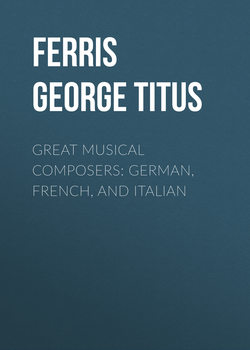Читать книгу Great Musical Composers: German, French, and Italian - Ferris George Titus - Страница 21
MOZART
I
ОглавлениеThe life of Wolfgang Amadeus Mozart, one of the immortal names in music, contradicts the rule that extraordinary youthful talent is apt to be followed by a sluggish and commonplace maturity. His father entered the room one day with a friend, and found the child bending over a music score. The little Mozart, not yet five years old, told his father he was writing a concerto for the piano. The latter examined it, and tears of joy and astonishment rolled down his face on perceiving its accuracy.
“It is good, but too difficult for general use,” said the friend.
“Oh,” said Wolfgang, “it must be practised till it is learned. This is the way it goes.” So saying, he played it with perfect correctness.
About the same time he offered to take the violin at a performance of some chamber music. His father refused, saying, “How can you? You have never learned the violin.”
“One needs not study for that,” said this musical prodigy; and taking the instrument, he played second violin with ease and accuracy. Such precocity seems almost incredible, and only in the history of music does it find any parallel.
Born in Salzburg, 27th January 1756, he was carefully trained by his father, who resigned his place as court musician to devote himself more exclusively to his family. From the earliest age he showed an extraordinary passion for music and mathematics, scrawling notes and diagrams in every place accessible to his insatiate pencil.
Taken to Vienna, the six-year-old virtuoso astonished the court by his brilliant talents. The future Queen of France, Marie Antoinette, was particularly delighted with him, and the little Mozart naïvely said he would like to marry her, for she was so good to him. His father devoted several years to an artistic tour, with him and his little less talented sister, through the German cities, and it was also extended to Paris and London. Everywhere the greatest enthusiasm was evinced in this charming bud of promise. The father writes home – “We have swords, laces, mantillas, snuff-boxes, gold cases, sufficient to furnish a shop; but as for money, it is a scarce article, and I am positively poor.”
At Paris they were warmly received at the court, and the boy is said to have expressed his surprise when Mdme. Pompadour refused to kiss him, saying, “Who is she, that she will not kiss me? Have I not been kissed by the queen?” In London his improvisations and piano sonatas excited the greatest admiration. Here he also published his third work. These journeys were an uninterrupted chain of triumphs for the child-virtuoso on the piano, organ, violin, and in singing. He was made honorary member of the Academies of Bologna and Verona, decorated with orders, and received at the age of thirteen an order to write the opera of “Mithridates,” which was successfully produced at Milan in 1770. Several other fine minor compositions were also written to order at this time for his Italian admirers. At Rome Mozart attended the Sistine Chapel and wrote the score of Allegri’s great mass, forbidden by the Pope to be copied, from the memory of a single performance.
The record of Mozart’s youthful triumphs might be extended at great length; but aside from the proof they furnish of his extraordinary precocity, they have lent little vital significance in the great problem of his career, except so far as they stimulated the marvellous boy to lay a deep foundation for his greater future, which, short as it was, was fruitful in undying results.
